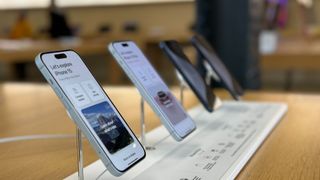Apple accused of using blood minerals from a region 'devastated by grave violations of human rights' in its products
Congo wants answers.

Apple has been accused by lawyers working for the Democratic Republic of the Congo (DRC) of using blood minerals in its products. The lawyers have reportedly written to Apple CEO Tim Cook to ask questions about fears that Apple's supply chain uses minerals "pillaged from the country."
Robert Amsterdam, founding partner of Amsterdam & Partners LLP alleges that “year after year, Apple has sold technology made with minerals sourced from a region whose population is being devastated by grave violations of human rights”. Apple has reportedly argued that it verifies the origins of the minerals that are used in its best iPhones and other products, but Amsterdam says that "those claims do not appear to be based on concrete, verifiable evidence."
The lawyers have also written to Apple subsidiaries in France to ask for answers.
Answers demanded
A press release shared by the lawyers details concerns and uses a slogan that has been made popular by Congolese soccer players — “Everyone sees the massacres in eastern Congo. But everyone is silent.”
"The world’s eyes are wide shut: Rwanda’s production of key 3T minerals is near zero, and yet big tech companies say their minerals are sourced in Rwanda," Amsterdam added.
The press release goes on to make multiple worrying allegations about companies working in the country including "numerous schemes that underpin and enable an extensive money laundering enterprise through the illegal trade in conflict minerals sourced from Congolese territory."
Apple has been asked for comment and we will update this piece if and when we receive a response. Apple issues an annual conflict minerals report, most recently in March 2024. In the report, Apple notes its plans to one day only use recycled and renewable materials in its products. Meantime, it says "As we make progress toward these ambitious goals, we continue to source 3TG and other minerals, such as cobalt and lithium, responsibly while working to improve conditions in and around mining communities, including in the Democratic Republic of the Congo (“DRC”) and adjoining countries." Apple says it does not directly purchase, procure, or source primary minerals, but remains committed to meeting and exceeding "internationally accepted due diligence standards."
Master your iPhone in minutes
iMore offers spot-on advice and guidance from our team of experts, with decades of Apple device experience to lean on. Learn more with iMore!
More from iMore

Oliver Haslam has written about Apple and the wider technology business for more than a decade with bylines on How-To Geek, PC Mag, iDownloadBlog, and many more. He has also been published in print for Macworld, including cover stories. At iMore, Oliver is involved in daily news coverage and, not being short of opinions, has been known to 'explain' those thoughts in more detail, too. Having grown up using PCs and spending far too much money on graphics card and flashy RAM, Oliver switched to the Mac with a G5 iMac and hasn't looked back. Since then he's seen the growth of the smartphone world, backed by iPhone, and new product categories come and go. Current expertise includes iOS, macOS, streaming services, and pretty much anything that has a battery or plugs into a wall. Oliver also covers mobile gaming for iMore, with Apple Arcade a particular focus. He's been gaming since the Atari 2600 days and still struggles to comprehend the fact he can play console quality titles on his pocket computer.